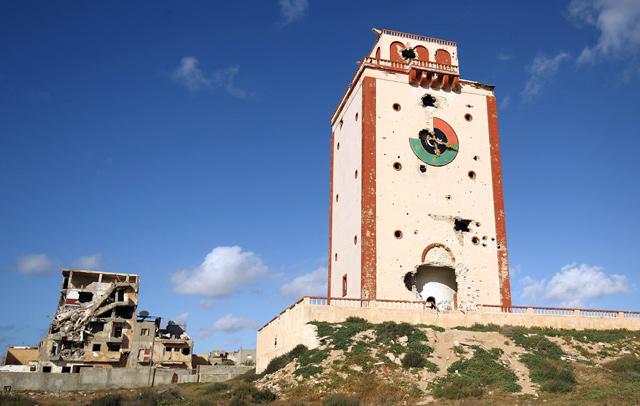You are here
Libyan leaders commit to December 10 elections
By AFP - May 30,2018 - Last updated at May 30,2018

Libya Chief of Staff Marshall Khalifa Haftar (centre), whose rival Libyan National Army dominates the country's east, stands on the steps of the Elysee Palace with his delegation as they leave following the International conference on Libya in Paris on Tuesday (AFP photo)
PARIS — Four Libyan leaders on Tuesday committed to holding elections in the fractured country on December 10 in a joint statement issued at a peace conference in Paris.
The four men, who represent most but not all of Libya's rival factions, also agreed to "accept the results of elections, and ensure appropriate funds and strong security arrangements are in place".
The commitment to holding parliamentary and presidential polls this year came after four hours of talks in Paris where they faced pressure to agree on a political roadmap that could end seven years of conflict.
European leaders see stabilising Libya as key to tackling militant threats and migration from the country, which has become a departure point for hundreds of thousands of Africans trying to reach Europe.
"I'm optimistic," UN envoy Ghassan Salame told AFP at the end of the talks.
The Libyan invitees were Prime Minister Fayez Al Sarraj, head of the UN-backed unity government in Tripoli, and 75-year-old military strongman Khalifa Haftar, whose rival Libyan National Army dominates the country’s east.
Also present were Aguila Saleh Issa, the parliament speaker based in the eastern city of Tobruk who opposes the UN-backed administration, and Khalid Al Mishri, the newly-elected head of the high council of state, who both agreed to the statement.
“There is no solution other than via you,” Tunisian President Beji Caid Essebsi told the Libyan leaders at the opening of the talks. “If things go badly, it’s your responsibility.”
Macron called the final agreement “an essential step toward reconciliation”, adding that the conference was “historic” because it had brought the rivals together around the same table for the first time.
‘Bravo!’
Despite the French-led efforts to seek a political settlement, many analysts and diplomats were sceptical about real change on the ground.
Some have voiced doubt whether the country, which is swamped by weapons and controlled by a patchwork of political groups and armed militias, will be able to hold elections.
“I believe that elections are a big risk in a country armed like Libya,” Federica Saini Fasanotti, an analyst with the Washington-based Brookings Institution, told AFP.
Some countries, such as former colonial power Italy, had also argued that the country needed to agree on a new constitution before holding elections.
Years of mediation by the United Nations, as well as Italy, have failed to bring stability to the north African nation which descended into chaos after the ousting of dictator Muammar Qadhafi in 2011.
Previous peace agreements have come to nothing.
“It went well. Afterwards, it depends on the implementation,” one diplomat told AFP on condition of anonymity.
The four leaders did not sign the agreement, instead giving their approval for the statement to be issued.
Posing for a group photo, Macron asked his guests to verbally commit to the deal — which they did.
“So we are all working on this common basis, bravo!” he said.
Regional competition
Representatives from 20 countries including Egypt, Russia, the United Arab Emirates, Qatar, Kuwait, Saudi Arabia and Turkey attended the talks, as well as neighbours Algeria and Tunisia.
Stabilising Libya has been complicated by diverging interests among Middle Eastern countries, which have sometimes backed opposing sides in the fighting, as well as the competition between Europeans.
Macron referred to foreign countries “pulling strings behind a curtain” but claimed that Tuesday’s agreement had put all regional actors on the same page.
The French leader threw himself into finding a solution shortly after his election in May 2017, inviting Sarraj and Haftar to Paris in July — a move that irked Italy.
Some in Rome suspect Macron of organising the conference at a time when Italy, which has major oil interests in Libya, is embroiled in a deep political crisis.
“It’s as if Macron wanted to make the most of this moment of absence by Italy on the Libyan dossier,” Italian newspaper La Repubblica wrote last week, citing diplomatic sources.
France is also suspected by some rivals within Libya of favouring Haftar, a military strongman who has fought Islamist militias and who was recently treated in a Parisian hospital for an undisclosed ailment.
“There is clear apprehension among many in western Libya that the French initiative is an attempt to reinforce the position of Khalifa Haftar as the key power broker in Libya,” said Mohamed Eljarh of the Libya Outlook consulting firm.
The International Crisis Group, an NGO that studies conflict zones, had also voiced caution about the French conference.
“Much more work remains to be done for a peace-building effort in Libya to succeed,” it said on Monday. “For this reason, Crisis Group believes that France should not request that its four Libyan guests sign an accord.”
Related Articles
PARIS — Libyan rivals will meet on Tuesday in Paris to agree on a political roadmap that aims to resolve disputed issues to pave the way for
PARIS, France — France plans to hold an international meeting in Paris with Libyan political leaders to push for an agreement on holding UN-
PARIS — The attempted offensive by Libyan strongman Khalifa Haftar on Tripoli has thrown into sharp relief the divisions between world power













